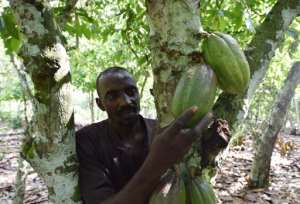
Geneva (AFP) - Ivory Coast, the world's top cocoa producer whose economy was battered by a low-level civil war and ensuing political unrest, should see double-digit growth this year, Prime Minister Daniel Kablan Duncan told AFP.
The west African country, which emerged from a bloody crisis less than four years ago, has seen its economy expand on average 9.0 percent since 2012, and this year "we want to reach a double-digit growth," Duncan said.
"We are ambitious in Cote d'Ivoire," he said, adding that he expected the country to maintain its high growth rates for years to come.
Speaking Tuesday on the sidelines of the Africa CEO Forum in Geneva, Duncan said drastic steps were being taken to dramatically transform the economy after a decade of conflict.
Ivory Coast, which is also the world's second largest producer of cashew nuts, is trying to diversify its key agriculture sector that accounts for nearly a third of its gross domestic product.
It aims to process more of its raw products locally, moving from just 35 percent of cocoa processed in the country now to "at least 60 percent before 2020," Duncan said.
The former star French colony is also striving to revive its mining industry and dramatically boost production.
Duncan said Ivory Coast's annual gold production had already leapt from just eight tonnes before his government came to power in late 2012 to 18 tonnes last year, adding that manganese production had seen "the same kind of growth."
As for its oil sector, Duncan said his government had "more than tripled the permits since we came to power."
All of this activity meanwhile requires far more electricity and Ivory Coast is aiming to boost capacity from 1,650 megawatts last year to 2,000 this year.
But the eventual target is 4,000 mW by 2020, enabling it to become a regional electricity supplier to neighbouring countries.
"Electricity is very important. You cannot have development if you don't have electricity," Duncan said.
- Investments financed with credit -
Ivory Coast's massive investments in infrastructure have largely been financed with credit.
Duncan said the country was set to sign up in coming months a $800-million loan from China to upgrade its electrical grid and transformers.
It has also tapped international lending markets twice in less than a year, issuing a $1.0 billion eurobond last month after raising $750 million in a eurobond placement last July.
It has borrowed about as much on the local market, Duncan acknowledged.
His government has faced harsh criticism for burdening the country with too much debt.
"The weight of the debt per inhabitant just keeps rising," lamented Mamadou Koulibaly, a finance minister under ousted president Laurent Gbagbo.
"Instead of seeing consumption rise, or industry productivity, we simply see the debt rising," he told AFP.
"The government has no economic policy beyond a succession of public expenses financed through debt. They are digging new holes to fill old holes," he said.
Duncan brushed aside the criticism, saying there was a special committee to ensure "the sustainability of the debt."
The International Monetary Fund and the World Bank were also keeping close tabs, he said.
"The government is simply doing its job... You have to invest, you have to make highways, roads," he said.
And while the country's loan facility in 2013 stood at around $4.0 billion, it only used $750 million, and last year it had a loan facility of $3.7 billion but used just $1.0 billion.
"We only take what we need," Duncan said.




 This IMANI job no dey pap; the people you are fighting for are always fighting y...
This IMANI job no dey pap; the people you are fighting for are always fighting y...
 Prof. Naana Opoku-Agyemang has changed; you can see a certain sense of urgency –...
Prof. Naana Opoku-Agyemang has changed; you can see a certain sense of urgency –...
 MFWA Executive Director slams Akoma FM for engaging in ‘irresponsible’ media pra...
MFWA Executive Director slams Akoma FM for engaging in ‘irresponsible’ media pra...
 ‘Women must become millionaires too’ — Prof Jane Naana on establishment of Women...
‘Women must become millionaires too’ — Prof Jane Naana on establishment of Women...
 Some believe only in Ghanaian votes, not Ghana — Kofi Asare jabs politicians
Some believe only in Ghanaian votes, not Ghana — Kofi Asare jabs politicians
 Plan to make BEST sole aggregator of Sentuo Oil Refinery will create market chal...
Plan to make BEST sole aggregator of Sentuo Oil Refinery will create market chal...
 2024 elections: I can't have the man I removed from office as my successor — Aku...
2024 elections: I can't have the man I removed from office as my successor — Aku...
 2024 Elections: Immediate-past NPP Germany Branch Chairman garners massive votes...
2024 Elections: Immediate-past NPP Germany Branch Chairman garners massive votes...
 Gov’t focused on making Ghana energy self-sufficient, eco-friendly – Akufo-Addo
Gov’t focused on making Ghana energy self-sufficient, eco-friendly – Akufo-Addo
 April 25: Cedi sells at GHS13.74 to $1, GHS13.14 on BoG interbank
April 25: Cedi sells at GHS13.74 to $1, GHS13.14 on BoG interbank
